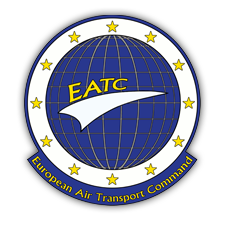In order to be able to make EATT14 run, the different responsibilities have been split into different cells or panels, every cell being responsible for a specific domain, a.e. exercise director, operations, training supervisor, flight safety, maintenance, intelligence, media & communication, computer and information system, ...

At the head of every panel a panel chief is responsible for the organization and the execution of the missions of his group of people.
Most of the panel chiefs come out of the EATC, what underlines the strong involvement of the EATC in EATT14 and what makes it easy to spread the EATC spirit and message amongst the participants of the exercise.
This is particularly visible in the Maintenance Cell where Maj Pierre Lambert puts a particular importance on Pooling and Sharing (P&S) and interoperability between nations. All these objectives are also in the scope of the EATC.
Maintenance Operation Center
The neuralgic spot of EATT’s maintenance is the so called MOC, the Maintenance Operation Center. Here, maintenance representatives out of all the participating nations and supplemental host nation representatives coordinate, under the lead of the experts from the EATC, all the maintenance activities, including cross-servicing, cross-maintenance, exchange of ground support equipment and spare parts.

Cross-servicing
Cross-servicing is the execution of services by the maintenance team of one nation on an aircraft of a second nation. The aim of cross-servicing is to improve multinational cooperation in order to increase interoperability and efficiency. During EATT14, this concept, based on STANAG 3430 (Responsibilities for Aircraft Cross Servicing) and STANAG 3812 (Responsiblities for Aircraft Cross Servicing Ground Crew Training), is trained by embedding one to two mechanics of a first nation into the maintenance organisation of the second nation. This trainee is, for the rest of the exercise, executing an “on the job training” (OJT) with his foreign colleagues. This OJT consists of marshalling the aircraft for arrival or departure, fitting or removing the safety pins, connecting the ground support equipment or even refuelling the aircraft.
After the successful completion of this training, a certificate of attendance is handed out to the trainee.

Exchange of GSE
Another initiative to improve multinational cooperation is the constitution of a common pool of ground support equipment (GSE).
As some of the nations use aircrafts of the same type (a.e. Italy, Norway, Belgium and France all use C-130), the constitution of a common pool of GSE permits to a nation not to ship all the necessary equipment to Plovdiv. So one nation brings the ladder, while another nation takes care of the ground power unit and the third nation is responsible for the maintenance kit or the tow bar.
This initiative also increases the interoperability between the nations and permits economies of scale because the logistics footprint of every participating nation is slightly reduced.

Exchange of spare parts
The exchange of spare parts is quite similar to the exchange of GSE.
What sounds simple in theory is in fact very complicated in practice.
Due to the actual airworthiness requirements, one nation is not necessarily allowed to use a spare part from another nation. This is due to the fact that every single spare part has to be certified as original by a qualified maintenance authority.
Amongst the EATC nations, Belgium, The Netherlands and Germany already exchange parts together with eight other nations through the Mutual Emergency Supply Support (MESS) procedure based on a Memorandum of Understanding (MoU) initiated by the former NATO EUROLOG Air Sub Group and signed in 1984.
Together with the EDA, EATC identified possibilities to exchange spare parts of aircrafts and in order to develop an agreement based on MESS, EATC drafted a document for the new Mutual Logistic Support (MLS) project which will be discussed by the participating member states during the next months.
The possibility to exchange spare parts between EATC Partner Nations, but also with other countries will improve the availability of spare parts and reduce the risk for an aircraft being stuck on the ground because of parts availability issues.
This will also improve the availability of the EATC fleet and its operational readiness.

Cross-maintenance
Cross-maintenance is the execution of maintenance tasks by a technician from one nation on an aircraft of another nation.
During EATT14, under the supervision of a mechanics of the nation the aircraft belongs to, a mechanics from another nation can execute some basic maintenance tasks on that foreign plane. To stick to the actual Airworthiness rules, the supervisor of the nation the aircraft belongs to has still to certify the correct execution of that task.
Thanks to the promulgation of the A400M Common Ground Crew Training Concept that procedure shall change. The first version of the Ground Crew Training Concept will be the guideline to implement and fine-tune new training concepts which shall lead to a complete interchangeability of the mechanics between the EATC Participation Nations.
All these initiatives from the maintenance panel – be it cross-servicing or cross-maintenance, exchange of GSE or exchange of spare parts make that the European Air Transport Command can be seen as a very successful example of international cooperation.

Find more views about EATT at our EATT 2014 picture gallery here.
Words: Pascal Ballinger
Pictures: Pascal Ballinger, Martin Gesenhoff

